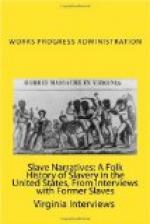He next owned a horse and buggy of which he was very proud. This increased his popularity with the girls and bye and bye he was married to Mary, a girl with whom he had been reared. Nobody was surprised but Mary, explained Mr. Dukes. “Me and everybody else knowed us ud get married some day. We didn’t jump over no broom neither. We was married like white folks wid flowers and cake and everything.”
Willis Dukes has been in Florida for “Lawd knows how long” and prefers this state to his home state. He still has a few relatives there but has never returned since leaving so long ago.
REFERENCE
1. Personal Interview with Willis Dukes, Valdosta Road, near Jeslamb Church, Madison, Florida
FEDERAL WRITERS’ PROJECT American Guide, (Negro Writers’ Unit)
Pearl Randolph, Field Worker
John A. Simms, Editor
Mulberry, Florida
October 8, 1936
SAM AND LOUISA EVERETT
Sam and Louise Everett, 86 and 90 years of age respectively, have weathered together some of the worst experiences of slavery, and as they look back over the years, can relate these experiences as clearly as if they had happened only yesterday.
Both were born near Norfolk, Virginia and sold as slaves several times on nearby plantations. It was on the plantation of “Big Jim” McClain that they met as slave-children and departed after Emancipation to live the lives of free people.
Sam was the son of Peter and Betsy Everett, field hands who spent long back-breaking hours in the cotton fields and came home at nightfall to cultivate their small garden. They lived in constant fear that their master would confiscate most of their vegetables; he so often did.
Louisa remembers little about her parents and thinks that she was sold at an early age to a separate master. Her name as nearly as she could remember was Norfolk Virginia. Everyone called her “Nor.” It was not until after she was freed and had sent her children to school that she changed her name to Louisa.
Sam and Norfolk spent part of their childhood on the plantation of “Big Jim” who was very cruel; often he would whip his slaves into insensibility for minor offences. He sometimes hung them up by their thumbs whenever they were caught attempting to escape—“er fer no reason atall.”
On this plantation were more than 100 slaves who were mated indiscriminately and without any regard for family unions. If their master thought that a certain man and woman might have strong, healthy offspring, he forced them to have sexual relation, even though they were married to other slaves. If there seemed to be any slight reluctance on the part of either of the unfortunate ones “Big Jim” would make them consummate this relationship in his presence. He used the same procedure if he thought a certain couple was not producing children fast enough. He enjoyed these orgies very much and often entertained his friends in this manner; quite often he and his guests would engage in these debaucheries, choosing for themselves the prettiest of the young women. Sometimes they forced the unhappy husbands and lovers of their victims to look on.




